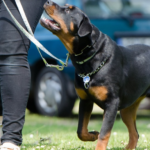When it comes to house training, some people may have concerns about their ability to learn and follow house rules. In this article, we will discuss whether Rottweilers are easy to house train and the steps you can take to ensure a successful training process.
Understanding Rottweiler’s personality
Rottweilers are intelligent dogs with a strong will, but they also have a sensitive side and are eager to please their owners. This makes them highly trainable and responsive to positive reinforcement techniques. However, they can also be stubborn and strong-willed at times, which means it’s important to establish a clear routine and consistent training methods from the start.
Factors that influence house training success
The success of house training a Rottweiler can be influenced by several factors, including the age of the dog, their environment, and their socialization experiences. Puppies are generally easier to train as they are more adaptable and have a shorter attention span, while older dogs may have already established habits that are harder to change. The environment in which a Rottweiler is raised and trained can also play a role in their ability to learn, so it’s important to create a positive and supportive environment for training.
The importance of patience and consistency
House training a Rottweiler requires patience and consistency. Consistent training sessions and routines can help a Rottweiler understand what is expected of them, while positive reinforcement techniques can encourage good behavior and build trust. It’s also important to be patient and not get discouraged if accidents happen, as this is a normal part of the learning process.
Training methods and tips
There are several effective training methods you can use when house training a Rottweiler, including crate training, scheduled feeding and potty times, and positive reinforcement techniques. It’s also important to have realistic expectations and understand that every dog learns at their own pace. To ensure success, it’s a good idea to consult with a professional dog trainer and seek advice from experienced Rottweiler owners.
How long does it take to potty train a rottweiler puppy
It can take several weeks to a few months to potty train a Rottweiler puppy, but the exact timeline can vary based on the individual dog and the owner’s consistency and patience. It typically takes 4-6 months to potty train a Rottweiler puppy, but with a consistent routine and positive reinforcement, some dogs may be fully trained in as little as 2-3 months. It’s important to remember that every puppy is different and potty training can be a gradual process.
Do Rottweilers make good house dogs?
Yes, Rottweilers can make good house dogs when they are well-trained and socialized. They are known for their loyalty, protectiveness, and obedience, making them great companions. However, it’s important to keep in mind that Rottweilers are large dogs that require proper exercise and training to maintain good behavior. They can also be wary of strangers and protective of their owners, so early socialization and obedience training are key to ensure they are well-behaved in the home. With proper care and training, Rottweilers can make great house dogs and loving companions.
Are Rottweilers hard to house train?
Rottweilers can be trainable, but they can also be stubborn at times, which can make house training more challenging. However, with consistent training, a positive reinforcement approach, and patience, Rottweilers can be successfully house trained. Like all dogs, the success of house training a Rottweiler will depend on several factors, including the age of the dog, their environment, and their individual personality. With the right approach, Rottweilers can be well-behaved and enjoy living in a home environment.
Summary
Rottweilers are trainable and responsive dogs that can be easy to house train with patience, consistency, and positive reinforcement techniques. Understanding their personality, the factors that influence their training success, and using effective training methods can help ensure a successful house training process. With the right approach and support, Rottweilers can be well-behaved and enjoyable pets to live with.







